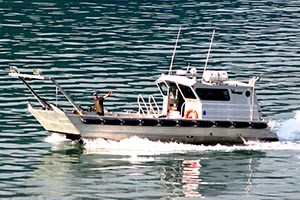 Colin Daugherty’s accent quickly gives him away as a native Chicagoan.
Colin Daugherty’s accent quickly gives him away as a native Chicagoan.
“It’s unlikely that I ended up here in Alaska, working on boats,” says Daugherty, a recent addition to the council’s Oil Spill Prevention and Response Committee. “I grew up in inner city Chicago. There was a program there that taught kids about boating skills and seamanship. I was part of that growing up, and it kept me out of trouble.”
Daugherty has been on and around boats ever since.
After school, he moved to St. Croix in the U.S. Virgin Islands, where he first got involved with spill prevention and response. He was hired at the Hovensa refinery, at the time the largest fuel refinery in the western hemisphere.
“I felt good about what we could do if bad things happen.”
After their daughter was born in St Croix, Daugherty and his wife decided to raise their family in Alaska. In 2003, he worked on cruises in Prince William Sound for a short time.
“That’s where I fell in love with the Sound, and really wanted to get back.”
Daugherty landed a job with Alaska Chadux in 2006, a not-for-profit oil spill response organization headquartered in Anchorage. He recently left Chadux to start a new business, Sundog Charters, a marine transportation and equipment rental business. As part of the business, he will continue to be involved with Chadux doing oil spill response support.
Comparing oil spills around the nation
Daugherty has worked on several major oil spills around the U.S. as well as numerous smaller spills in Alaska. He was a division leader during both the 2010 BP Deepwater Horizon spill in the Gulf of Mexico and the 2007 Cosco Busan spill in San Francisco Bay.
“One thing that I noticed, in all spill responses, it really comes down to logistics,” Daugherty. He says the lack of infrastructure and vast distances in Alaska means responders pay closer attention to the supply chain and response support.
“I noticed down south not a lot of attention was paid to removing debris from vessels or feeding and housing responders,” Daugherty said. “It was interesting. I noted that Alaskans would come down, maybe after the initial response, working with subcontractors, and it really seemed like Alaskans brought order. They brought focus to those responses and got people to focus on the logistics, getting water and fuel for the vessels, or making sure the spill responders had all the protective equipment they needed.”
“I think it’s taken for granted down in the Gulf of Mexico where they have all the resources in the world,” said Daugherty. “Everyone gets so excited about picking up oil that they forget about these other basic necessities.”
At Chadux, Daugherty was part of a team that developed oil spill exercises in Prince William Sound, Dutch Harbor, and Nome.
“Not to sound like a broken record, but they were often exercises in logistics. You know, picking up oil isn’t rocket science. Getting the equipment to the site and figuring out how you operate remotely seems to be the biggest benefit of the exercises that we conducted.”
“You find out that internet service doesn’t work very well in Unalaska, you have to rely on old technology such as a fax machine in remote areas,” Daugherty said. “You have to go low-technology on a lot of aspects that in other parts of the world they would have no trouble with.”
On council projects
A council project that Daugherty is especially interested in is the effort to find a nontoxic “surrogate” for oil that can be used during exercises to help responders train.
“I think that’s really going to help folks understand what it’s truly like to go out there and herd something and then to try to remove it from the water,” he said. “It’s a big challenge just finding oil, and then trying to get it together where you can skim it.”
Alyeska’s program to train fishermen and other mariners to clean up oil spills has also caught his interest. Responders in the Gulf of Mexico oil spill tried a similar program during that response, called a “vessel of opportunity” program. Daugherty says there were differences that made an impact.
“The SERVS’ program, I wouldn’t consider it a ‘vessel of opportunity’ program because folks are on contract, and they do have an obligation to respond, depending on where they are in the program. And that’s good, I think that’s fantastic. A true vessel of opportunity program, vessels are just pre-identified, maybe pre-trained, but they aren’t necessarily obligated to respond.”
“In the Deepwater Horizon incident, most weren’t pre-trained or even pre-vetted. They were signed up in-situ and it showed. There was a lot of chaos, a lot of people that didn’t know what to do. So I think having the program that pre-trains, pre-vets vessels is really important to being able to get an early start on responding to an incident.”
Daugherty is happy to help protect Prince William Sound through his volunteer work at the council. “The Sound is my second home, where I chose to end up in my life, and I look forward to having it there for my children. So preserving it and preventing future incidents is pretty high on my priority list.”
Colin Daugherty is a member of the council’s Oil Spill Prevention and Response Committee. The committee works to minimize the risks and impacts associated with oil transportation by reviewing and recommending strong spill prevention and response measures, adequate contingency planning, and effective regulations. This committee is one of five committees of volunteers from communities affected by the Exxon Valdez oil spill. Volunteers like Daugherty dedicate their time and expertise to advise the council on technical issues related to the safe transportation of oil through Prince William Sound.